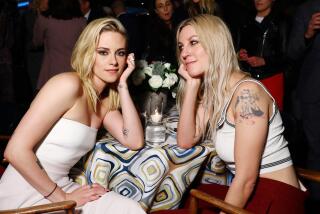4 Weddings and a Funeral : Couples Renew Vows at Temple and Bury Repression of Soviet Past
- Share via
Alex Khoroshan stood inside Temple Beth Hillel on Sunday with a smile as wide as his native Ukraine, a man who could finally say to his wife--who was on this day also his bride--that they were two Jews from the former Soviet Union who were finally, truly free at last.
On this bright afternoon at the temple in Valley Village, Khoroshan, his wife, of ten 10 months, Olga Shelkovsky, and three other couples were renewing their marriage vows, this time the way they had always dreamed--in a sacred temple. That was a privilege that for years had been denied each of the immigrant couples back home.
“For the first time,” said the 40-year-old accountant, dressed in a dapper lime-green suit, matching white carnation and yarmulke, “I feel like I am really, really married.”
This, then, was a day for four weddings and a funeral: The vows--uttered in the tentative near-whispers of people still uncertain of their English--were a celebration of present and future as well as a way to lay to rest the religious persecution of their Communist past.
Back in Kiev, a city of 3 million with just one tiny synagogue, going to temple to express one’s faith was a foolhardy thing to do. Still, every day the temple was crowded with Jews who took the chance of coming out and encountering government agents who took names and pictures.
“Once I went to celebrate a Jewish holiday and a few days
later I was called into my boss’s office at work and told that if I ever did something so stupid again, I’d be fired,” Khoroshan recalled. “The chief officer of my company was there with KGB agents. They were not happy. Ukraine was the most anti-Semitic country in the entire Soviet Union.”
The eight brides and grooms are among about 100 families from the former Soviet Union who are now members of the San Fernando Valley synagogue. Many more are expected to renew their marital vows in their new country.
“These are the first ones,” said Jane Ulman, director of community service for Temple Beth Hillel. “A lot of people who are here today want to see these couples test the waters. For these people, this is a big step, something that would have been unthinkable back home.”
Also in the crowd of 50 celebrants were two dozen visiting Russian Jews on a tour of Los Angeles.
For the brief ceremony, all four couples stood huddled beneath the wedding canopy known as a chuppah, the women holding bouquets in their trembling hands. Each couple shared the tallit, or prayer shawl, a proclamation that they plan to live their lives and raise their families as practicing Jews.
“Thank you for the example of what you are doing,” Rabbi James Kaufman told the participants. “It’s hard to be first. But you will inspire others. You are here in this country, here on this pulpit, because you have courage.”
For Boris Entin, just being able to wear his yarmulke in public was like some dream come true. Back home, he recalled, many of his own people preferred blending into the prevailing culture rather than clinging to their roots--no matter how hard their ancestors had battled to keep the faith.
“Jews who wore yarmulkes on the streets of Moscow were asking for trouble,” he noted. “I can’t say people would throw stones at you, but you would stick out. Much like a white elephant on the streets of Los Angeles.”
For Rivka, a bride who asked that her last name not be used, Sunday’s ceremony “was like a gift, a blessing.”
Rivka recalled the tears she shed three years ago when she first experienced the sense of freedom upon entering a synagogue in the United States. “Until that day I really didn’t understand all the things I had missed, how poor I was without all this,” she said. “For someone like me, you cannot conceive what this meant. The handcuffs came off. They simply dropped to the floor.”
Sunday was also a day of romance.
Throughout the ceremony, 36-year-old Galina Rovensky kept sneaking glances at her husband, Mikhail, thinking about the time in St. Petersburg when they first met in the factory where both worked. “I liked him right away,” she said. “Right away, I said to myself, ‘This is the man I am going to marry.’ Of course, he didn’t know it yet.”
*
But perhaps the most romantic tale of them all was that shared by Alex and Olga.
He had taken a vacation from the United States--a trip to Israel to visit his parents--when he met her through friends. “I was waiting to get married,” he said. “But that was because I had never met anyone like Olga. Immediately, I felt as though I knew this woman. I don’t know, maybe in another life.”
That same day, the couple went on a stroll to a nearby mall. They talked for five hours straight--about their childhoods back in the Ukraine, about his life in the United States. Then Khoroshan had an impulse: He excused himself and rushed away to buy this woman a bouquet of red roses.
He boldly put them in her arms and said, “I would like to give you flowers more often. I would like to marry you.”
Olga looked him dead in the eye for a few suspenseful moments, he recalled. He saw tears forming. And then she said, “Yes.”
“People say I am crazy to do this,” he said. “My life with Olga is so wonderful, often I pinch myself. But I know I am not crazy.”
More to Read
Sign up for Essential California
The most important California stories and recommendations in your inbox every morning.
You may occasionally receive promotional content from the Los Angeles Times.














